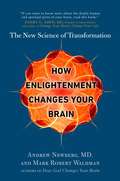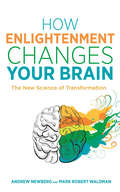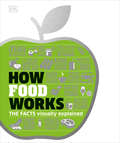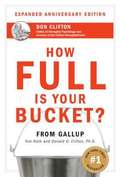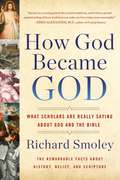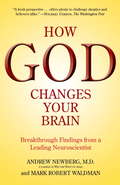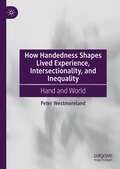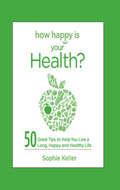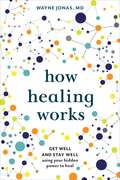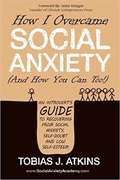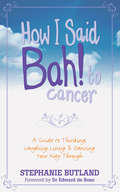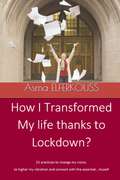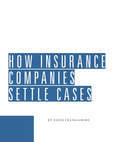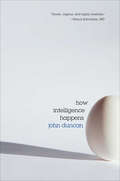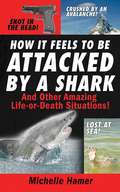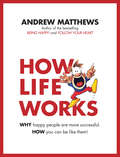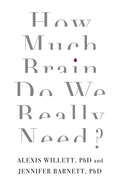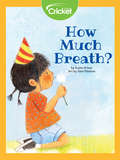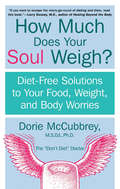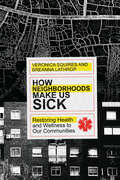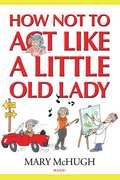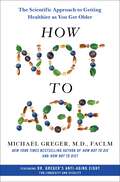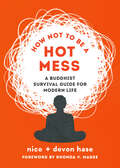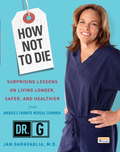- Table View
- List View
How Enlightenment Changes Your Brain: The New Science of Transformation
by Andrew Newberg Mark Robert WaldmanThe bestselling authors of How God Changes Your Brain reveal the neurological underpinnings of enlightenment, offering unique strategies to help readers experience its many benefits. In this original and groundbreaking book, Andrew Newberg, M.D., and Mark Robert Waldman turn their attention to the pinnacle of the human experience: enlightenment. Through his brain- scan studies on Brazilian psychic mediums, Sufi mystics, Buddhist meditators, Franciscan nuns, Pentecostals, and participants in secular spirituality rituals, Newberg has discovered the specific neurological mechanisms associated with the enlightenment experience--and how we might activate those circuits in our own brains. In his survey of more than one thousand people who have experienced enlightenment, Newberg has also discovered that in the aftermath they have had profound, positive life changes. Enlightenment offers us the possibility to become permanently less stress-prone, to break bad habits, to improve our collaboration and creativity skills, and to lead happier, more satisfying lives. Relaying the story of his own transformational experience as well as including the stories of others who try to describe an event that is truly indescribable, Newberg brings us a new paradigm for deep and lasting change.From the Hardcover edition.
How Enlightenment Changes Your Brain: The New Science of Transformation
by Andrew Newberg Mark Robert WaldmanIn this original and groundbreaking book, Dr Andrew Newberg and Mark Robert Waldmanturn their attention to the pinnacle of the human experience: enlightenment. Through his brain-scan studies on Brazilian psychic mediums, Sufi mystics, Buddhist meditators, Franciscan nuns, Pentecostals, and participants in secular spirituality rituals, Newberg has found the specific neurological mechanisms responsible for an enlightenment experience - and how we can activate those circuits in our own brains.In his survey of more than one thousand people who have experienced enlightenment, Newberg has also discovered that in the aftermath they have had profound, positive life changes. Enlightenment offers us the possibility to become permanently less stress-prone, to break bad habits, to improve our collaboration and creativity skills, and to lead happier, more satisfying lives. Relaying the story of his own transformational experience as well as including the stories of others who try to describe an event that is truly indescribable, Newberg brings us a new paradigm for deep and lasting change.
How Food Works: The Facts Visually Explained (DK How Stuff Works)
by DKLet this guide be your very own friendly nutritionist, on hand to debunk common food myths and give you the answers to those pressing health questions with easy-to-swallow information.Is red wine good for your heart? Will caffeine raise your blood pressure? How Food Works gives you answers to these and several more questions by investigating claims surrounding a variety of foods and examining them from a biological standpoint. Discover nutritional facts about the food you eat, learn the benefits of superfoods and antioxidants, and go behind-the-scenes of modern food production.Packed with infographics and colorful images, the book delves into the science behind ways of eating including gluten-free and veganism, as well as the benefits of different diets from around the world. Turn the pages to understand why food intolerances occur, what actually makes food organic, how important sell-by dates really are, and how much salt you should really be eating. Readers will also learn about the social and economic implications of food choices, such as eating disorders and fair-trade businesses. Indispensable and accessible to young and old, How Food Works is the perfect health and dietary companion.
How Full Is Your Bucket?
by Tom Rath Donald O. CliftonOrganized around a simple metaphor of a dipper and a bucket -- already familiar to thousands of people -- How Full is Your Bucket? shows how even the smallest interactions we have with others every day profoundly affect our relationships, productivity, health, and longevity. Co-author Donald O. Clifton studied the effects of positive and negative emotions for half a century, and he and his colleagues interviewed millions of people around the world. Their discoveries contributed to the emergence of an entirely new field: Positive Psychology. These same discoveries are at the heart of How Full is Your Bucket? Clifton, who also coauthored the bestseller Now, Discover Your Strengths, penned How Full is Your Bucket? with grandson Tom Rath. Written in an engaging, conversational style, their book includes colorful stories, 5 strategies for increasing positive emotions, and features an online test that measures readers' Positive Impact. How Full is Your Bucket? is a quick, breezy read. It will immediately help readers boost the amount of positive emotions in their lives, and in the lives of everyone around them. The book is sure to inspire lasting changes in all who read it, and has all the makings of a timeless classic.
How God Became God: What Scholars Are Really Saying About God and the Bible
by Richard M. SmoleyThis epic, thrilling journey through Bible scholarship and ancient religion shows how much of Scripture is historically false--yet the ancient writings also resound with theologies that crisscrossed the primeval world and that direct us today toward a deep, inner, authentic experience of the truly sacred.From a historical perspective, the Bible is shockingly, provably wrong--a point supported by today's best archaeological and historical scholarship but not well understood by (or communicated to) the public. Yet this emphatically does not mean that the Bible isn't, in some very real measure, true, argues scholar of mysticism Richard Smoley. Smoley reviews the most authoritative historical evidence to demonstrate that figures such as Moses, Abraham, and Jesus are not only unlikely to have existed, but bear strong composite resemblances to other Near Eastern religious icons. Likewise, the geopolitical and military events of Scripture fail to mesh with the largely settled historical time line and social structures. Smoley meticulously shows how our concepts of the Hebrew and Christian God, including Christ himself, are an assemblage of ideas that were altered, argued over, and edited--until their canonization. This process, to a large degree, gave Western civilization its consensus view of God. But these conclusions are not cause for nihilism or disbelief. Rather, beneath the metaphorical figures and mythical historicism of Scripture appears an extraordinary, truly transcendent theology born from the most sacred and fully realized spiritual and human insights of the antique Eastern world. Far from being "untrue," the Bible is remarkably, extraordinarily true as it connects us to the sublime insights of our ancient ancestors and points to a unifying ethic behind many of the world's faiths.From the Trade Paperback edition.
How God Changes Your Brain: Breakthrough Findings from a Leading Neuroscientist
by Andrew Newberg Mark Robert Waldman"How God Changes Your Brain" is a highly practical, easy-to-read guide on the interface between spirituality and neuroscience, filled with useful information that can make your brain and your life better. --Daniel G. Amen, M. D.
How Handedness Shapes Lived Experience, Intersectionality, and Inequality: Hand and World
by Peter WestmorelandThis book delivers philosophy’s first sustained examination of handedness: being left-handed, right-handed, etc. It engages literature from phenomenology and continental philosophy, analytic philosophy, laterality studies, cognitive science and psychology, gender studies and feminist philosophy, sociology, political science, and more to provide a systematic accounting of the nature of handedness, its basis in lived experience, its effects on bodily performance, its role in varieties of inequality, and its part in oppression and liberation.As a radical asymmetry in the body, handedness plays a key role in human flourishing. It informs both personal bodily movement and social life, from handshakes and high fives to high tech tools made for one hand or the other. Moreover, with left-handers making up just 10% of the population, handedness presents a significant inequality in lived experience. To live and live well, we must understand handedness.
How Happy Is Your Health?
by Sophie KellerChange your health...for the happier.With these 50 tips, it's easier than ever to become your healthiest self possible, starting now. Discover:- How putting a mirror on your fridge can help you lose weight.- Which vitamin is known to prevent cancer and depression.- Easy ways to cut cravings.- Which plastics are safe to use.Take charge of your happiness, one tip at a time.
How Healing Works: Get Well and Stay Well Using Your Hidden Power to Heal
by Wayne JonasDrawing on 40 years of research and patient care, Dr. Wayne Jonas explains how 80 percent of healing occurs organically and how to activate the healing process.In How Healing Works, Dr. Wayne Jonas lays out a revolutionary new way to approach injury, illness, and wellness. Dr. Jonas explains the biology of healing and the science behind the discovery that 80 percent of healing can be attributed to the mind-body connection and other naturally occurring processes. Jonas details how the healing process works and what we can do to facilitate our own innate ability to heal. Dr. Jonas's advice will change how we consume health care, enabling us to be more in control of our recovery and lasting wellness. Simple line illustrations communicate statistics and take-aways in a memorable way. Stories from Dr. Jonas's practice and studies further illustrate his method for helping people get well and stay well after minor and major medical events.
How I Overcame Social Anxiety (And How You Can Too!): An Introverts Guide to Recovering from Social Anxiety, Self-Doubt and Low Self-Esteem
by Tobias J. Atkins<p>Do you get nervous in public and don’t know why? Do you find it hard to relax and be yourself around people? Do you constantly worry what everyone thinks of you? Are you tired of always feeling inferior and ‘less than’ others? Wish you could turn off that critical voice inside your head? Perhaps you feel you were ‘born that way’ and things will never change? <p>This book documents my 15 year struggle with social anxiety; the contributing factors and the exact steps I took to find my healing. In these pages, you’ll discover: <p> <li>The real causes behind your social anxiety & shyness (it’s not what you think) <li>The exact steps I took to overcome social anxiety (and how you can too!) <li>How to stop fearing the opinions and judgments of others <li>How to let go of perfectionism and always putting yourself down <li>What I learned from spending over $35,000 on alternative therapies <li>Techniques to release anxiety and self-consciousness in minutes, not years</li> </p>
How I Said Bah! to Cancer: A Guide to Thinking, Laughing, Living and Dancing Your Way Through
by Stephanie ButlandThis book tells how one woman said ‘Bah!’ to cancer through thinking strategies, a proactive approach to treatment, and a determination to keep the rest of her life going and retain a sense of humour (most of the time!). It shares everything she learnt along the way, from the nature of cancer cells and chemotherapy drugs, to how she was able to help her friends and family to help her. ‘I was never going to die from cancer. That hard lump peeping out of the top of my bra was aggressive but it was small enough to be contained, and I was young and strong and otherwise well. All the signs were good. Words like "lucky" and "caught in time" were thrown around like rice at a wedding. No, I was never going to die from cancer. But from the beginning, I never planned simply to survive it. Oh no. I was going to say a great big Bah! to it. Please, join in. Cancer? Bah!’
How I Transformed my Life Thanks to Lockdown: 21 practices to change my vision, to higher my vibration and connect with the essential...myself
by Asma ElferkoussFeeling oppressed during lockdown, I decided to take life into my own hands and dedicate myself to change... I put into practice a series of rituals that helped me transform from a shy and victimised individual into a dynamic young woman able to make her dreams come true...
How Insurance Companies Settle Cases
by David FrangiamoreHow Insurance Companies Settle Cases Speed up the processing of your claims and reduce your frustration with insurance companies with How Insurance Companies Settle Cases. Knowing how insurance companies operate can help you obtain fair settlements faster. By learning what counts with the home office and what doesn't, you can present your case in its best light with minimum wasted effort, and make both you and your case stand out. This book gives you insider information that reveals how insurance companies evaluate and negotiate claims. Find answers to these questions: * How do insurance companies value cases? * What do adjusters need to settle a case? * Who makes the real decisions on insurance cases? * How do insurance companies value pre-existing injuries? * How do I prove my client really suffers from a soft tissue injury? * What is the structure of most claims departments? * How do I learn policy limits and get a copy of the insurance policy?
How Intelligence Happens
by John DuncanHuman intelligence is among the most powerful forces on earth. It builds sprawling cities, vast cornfields, coffee plantations, and complex microchips; it takes us from the atom to the limits of the universe. Understanding how brains build intelligence is among the most fascinating challenges of modern science. How does the biological brain, a collection of billions of cells, enable us to do things no other species can do? In this book John Duncan, a scientist who has spent thirty years studying the human brain, offers an adventure story--the story of the hunt for basic principles of human intelligence, behavior, and thought. Using results drawn from classical studies of intelligence testing; from attempts to build computers that think; from studies of how minds change after brain damage; from modern discoveries of brain imaging; and from groundbreaking recent research, Duncan synthesizes often difficult-to-understand information into a book that will delight scientific and popular readers alike. He explains how brains break down problems into useful, solvable parts and then assemble these parts into the complex mental programs of human thought and action. Moving from the foundations of psychology, artificial intelligence, and neuroscience to the most current scientific thinking,How Intelligence Happensis for all those curious to understand how their own mind works.
How it Feels to Be Attcked by a Shark: And Other Amazing Life-or-death Situations!
by Michelle HamerWhat does it feel like to find yourself in the grip of a 15-foot Great White shark? To be struck not once but twice by lightning? Here are 40 incredible true-life stories of people who lived through the most harrowing experiences you could imagine. In some cases, they stared death right in the face; in others, they wished they could die but somehow found the strength to go on. A remarkable group of survivors explain, in their own words, what it's like to get shot in the head, brainwashed by a cult, buried by an avalanche, attacked by a crocodile, and much more. What they have to say will surprise and enlighten, and certainly satisfy our curiosity about what it means to go to the very edge...and come back.
How Life Works: Why Happy People are More Successful. How You Can Be Like Them!
by Andrew MatthewsA fun, whimisical primer to the New Thought movement.THE MYTH: Success makes you happy. THE FACT: Happiness makes you successful.It's not about who you know, or even what you know. It's about how good you feel, which, luckily for you, is entirely within your own power. Discover how to feel good, replace patterns of fear and failure with love and kindness, and create the life of abundance you've always dreamt of: * Doing work you love * Surrounded by people you love * And with the love of your life'In a Nutshell' features throughout provide useful reminders of the key valuable lessons in each chapter.How Life Works is illustrated with 90 of Andrew's trademark sketches. "My cartoons illustrate the message", says Andrew. "Cartoons also remind us not to take life too seriously."
How Much Brain Do We Really Need?
by Dr Jennifer Barnett Dr Alexis WillettYour brain is shrinking. Does it matter?How Much Brain Do We Really Need? challenges us to think differently about the brain. Rather than just concentrating on the many wonderful things it can do, this entertaining insight into the complexities and contradictions of the human brain asks whether in fact we can live satisfactorily without some of it.The bad news is that our brains start to shrink from our mid-thirties. But the good news is that we still seem to generally muddle along and our brain is able to adapt in extraordinary ways when things going wrong.Alexis Willett and Jennifer Barnett shed light on what the human brain can do - in both optimal and suboptimal conditions - and consider what it can manage without. Through fascinating facts and figures, case studies and hypothetical scenarios, expert interviews and scientific principles, they take us on a journey from the ancient mists of time to the far reaches of the future, via different species and lands.Is brain training the key to healthy ageing? Do women really experience 'baby brain'? Is our brain at its evolutionary peak or do we have an even more brilliant future to look forward to? We discover the answers to these questions and more.
How Much Breath?
by Susan GrinerHow much breath does it take to blow the petals off a dandelions, to blow bubbles, and to blow out birthday candles?
How Much Does Your Soul Weigh?
by Dorie MccubbreyYou hold in your hands a life-changing weight control revelation -- a holistic approach to help you overcome all eating and weight problems from anorexia to obesity. This innovative book will shed light on your unsuccessful attempts at dieting and help you begin to heal from the inside out, once and for all! How many "miracle diets" have you tried? How many minutes and hours have you spent worrying about the numbers on the bathroom scale? How many times have you lost weight only to gain it back along with renewed disappointment and frustration? You've worried about how much your body weighs, but have you asked: How Much Does Your Soul Weigh? Dr. Doric McCubbrey, a weight-issues specialist whose practice boasts a 95 percent success rate, reveals that the weight of your soul may be preventing you from effecting the changes you want to see in your appearance and self-esteem. By starting Dr. Dorie's plan for "Intuitive Self-Care," you can begin to unburden your soul of all the "weighty attitudes" of the diet mentality -- rigid rules, negative self-talk, and unrealistic goals -- that lead to very real feelings of disappointment and hopelessness. With empathy and insight, Dr. Doric explores and explains the importance of a soulful attitude toward your eating, exercise, and weight. You'll discover: the "games" dieters play -- and why none of them works the four archetypal weight problems and how to overcome them for good the secrets of naturally thin people -- and how you can incorporate them into your life a 30-day plan of therapeutic "recipes" designed especially to nourish your soul Packed with stories from Dr. Dorie's own 15-year struggle with overeating, anorexia, and bulimia, and the experiences of her clients, How Much Does Your Soul Weigh? shows you how to generate the happiness, health, balance, and confidence that will put your weight worries to rest for good!
How Neighborhoods Make Us Sick: Restoring Health and Wellness to Our Communities
by Veronica Squires Breanna LathropOur neighborhoods are literally making us sick. Buildings with mold trigger asthma and other respiratory conditions. Geographic lack of access to food and health care increases childhood mortality. Community violence traumatizes residents. Poverty, unemployment, inadequate housing, food insecurity, racial injustice, and oppression cause physical changes in the body, resulting in disease and death. But there is hope. Loving our neighbor includes creating social environments in which people can be healthy. While working in community redevelopment and treating uninsured families, Veronica Squires and Breanna Lathrop discovered that creating healthier neighborhoods requires a commitment to health equity. Jesus' ministry brought healing through dismantling systems of oppression and overturning social norms that prevented people from living healthy lives. We can do the same in our communities through addressing social determinants that facilitate healing in under-resourced neighborhoods. Everyone deserves the opportunity for good health. The decisions we make and actions we take can promote the health of our neighbors.
How Not to Act Like a Little Old Lady
by Mary MchughIn this humorous, advice-filled book, best-selling author Mary McHugh has written down her secrets for living a long and happy life after 50. If you're looking for ways to enrich your days, to be happier, to find a new approach to life's problems, you need this book. It's for everyone who wants to make the years ahead more fulfilling, more fun and more meaningful. Each chapter is a short take on making every day better than the day before. If you want to look better, feel better, have more fun, try the tips in this easy-to-read, lively book, so you never act like a little old lady.
How Not to Age: The Scientific Approach to Getting Healthier as You Get Older
by Michael Greger M.D.Instant New York Times BestsellerUncover the evidence-based science to slowing the effects of aging, from the New York Times bestselling author of the How Not to Die series When Dr. Michael Greger, founder of NutritionFacts.org, dove into the top peer-reviewed anti-aging medical research, he realized that diet could regulate every one of the most promising strategies for combating the effects of aging. We don’t need Big Pharma to keep us feeling young—we already have the tools. In How Not to Age, the internationally renowned physician and nutritionist breaks down the science of aging and chronic illness and explains how to help avoid the diseases most commonly encountered in our journeys through life.Physicians have long treated aging as a malady, but getting older does not have to mean getting sicker. There are eleven pathways for aging in our bodies’ cells and we can disrupt each of them. Processes like autophagy, the upcycling of unusable junk, can be boosted with spermidine, a compound found in tempeh, mushrooms, and wheat germ. Senescent “zombie” cells that spew inflammation and are linked to many age-related diseases may be cleared in part with quercetin-rich foods like onions, apples, and kale. And we can combat effects of aging without breaking the bank. Why spend a small fortune on vitamin C and nicotinamide facial serums when you can make your own for up to 2,000 times cheaper?Inspired by the dietary and lifestyle patterns of centenarians and residents of “blue zone” regions where people live the longest, Dr. Greger presents simple, accessible, and evidence-based methods to preserve the body functions that keep you feeling youthful, both physically and mentally. Brimming with expertise and actionable takeaways, How Not to Age lays out practical strategies for achieving ultimate longevity.
How Not to Be a Hot Mess: A Survival Guide for Modern Life
by Craig Hase Devon HaseThe dumpster fire of life rages on, but you got this. Practice six rules to keep you grounded, weather the storm, and actually be a decent person.It may seem like the world is going to hell in a hand basket right now. Whether it's big stuff like politics and climate change, or just the daily spin of paying your bills, getting to work on time, and fending off social media trolls, we can all admit, modern life ain't easy. Here are six really good guiding principles, inspired from the ancient wisdom of Buddhism and mindfulness practice, to keep you anchored and steady amidst the chaos.
How Not to Be a Hot Mess: A Buddhist Survival Guide for Modern Life
by nico hase devon haseThe dumpster fire of life rages on, but you got this. Practice six rules to keep you grounded, weather the storm, and actually be a decent person.It may seem like the world is going to hell in a hand basket right now. Whether it's big stuff like politics and climate change, or just the daily spin of paying your bills, getting to work on time, and fending off social media trolls, we can all admit, modern life ain't easy. Here are six really good guiding principles, inspired from the ancient wisdom of Buddhism and mindfulness practice, to keep you anchored and steady amidst the chaos.
How Not to Die: Surprising Lessons on Living Longer, Safer, and Healthier from America's Favorite Medical Examiner
by Jan GaravagliaDr Jan Garavaglia is one of America's top forensic pathologist. By using cutting-edge forensic science and technology, she explores the reasons for sudden and unexplained deaths. As a result, she has developed a unique insight into life, safety and health. In this unique and accessible health book, Dr Garavaglia reveals how to live better today by investigating how others die. The dead have a lot to teach us. More often than not, it is not the dramatic or traumatic that can kill us, but often the small lapses in attention and judgment when it comes to our own health and safety. Organised around topics to bring the reader better health (such as losing weight, overcoming addictions, better nutrition, avoiding accidents), this book is unlike any other health book because it gets to the heart of the matter of how not to die.
